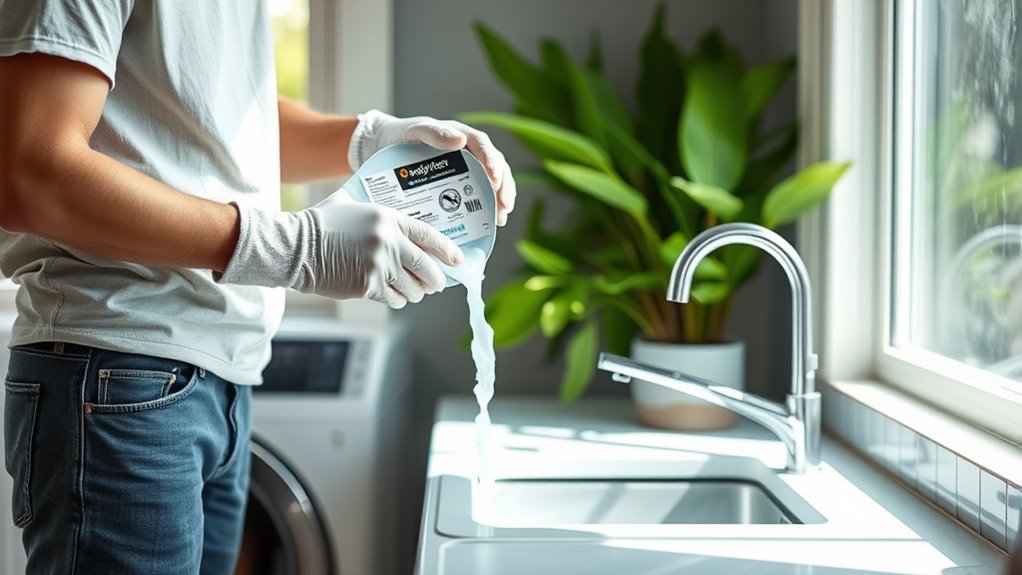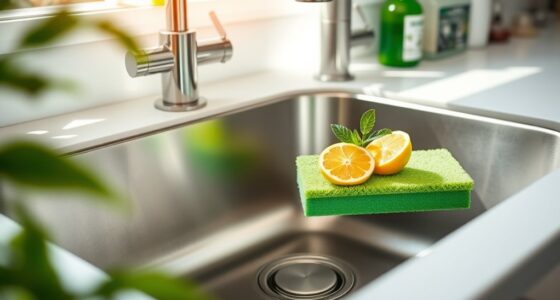To practice greywater-safe cleaning at home, choose eco-friendly detergents free of harsh chemicals like phosphates and chlorine. Avoid using bleach and heavy-duty cleaners, and instead opt for natural solutions like vinegar or baking soda. Properly divert greywater to ornamental plants or lawns, and avoid edible crops unless confirmed safe. Regular maintenance and following guidelines help prevent contamination, ensuring safety for your family and the environment. Keep exploring to discover even more simple practices you can incorporate.
Key Takeaways
- Use eco-friendly detergents like vinegar, baking soda, or castile soap that are safe for greywater systems.
- Avoid harsh chemicals such as bleach, chlorine, and synthetic fragrances to prevent soil and plant contamination.
- Properly divert greywater to appropriate outdoor areas, avoiding edible crops and ensuring natural absorption.
- Regularly inspect and maintain greywater systems to prevent leaks, clogs, and environmental hazards.
- Follow water conservation tips, like fixing leaks and using full loads, to reduce overall greywater generation.

Are you looking for ways to keep your home clean while also protecting the environment? Embracing greywater-safe cleaning practices is a smart move that not only reduces water waste but also minimizes your impact on the planet. One effective approach is to choose eco friendly detergents that are designed to be gentle on the environment and safe for reuse as greywater. These detergents typically avoid harsh chemicals like phosphates, chlorine, and synthetic fragrances, which can harm plants and soil when greywater is reused for irrigation. By switching to eco friendly detergents, you ensure that the water you recycle won’t introduce toxins into your garden or groundwater, making your cleaning routine more sustainable.
Choosing eco-friendly detergents protects your garden and the planet.
In addition to selecting eco friendly detergents, implementing water conservation tips can drastically reduce your overall water usage. Simple practices like fixing leaks promptly and installing water-efficient fixtures help cut down on unnecessary water waste. When doing laundry or cleaning, consider the volume of water needed for each task. For example, running full loads rather than partial ones optimizes water use and reduces the amount of greywater generated. You can also collect rainwater or reuse greywater from sinks and showers for outdoor tasks, provided you follow safe guidelines to prevent contamination. Additionally, understanding the types of cleaning products suitable for greywater reuse can help you make informed choices that protect your system and environment.
Using greywater safely means understanding which cleaning practices are compatible with greywater reuse. Avoid using bleach, antibacterial agents, or heavy-duty cleaning products that may contain harmful chemicals. Instead, opt for natural cleaning solutions like vinegar, baking soda, or castile soap, which are effective and safe for greywater systems. These options help you maintain cleanliness without risking soil or plant health when you reuse greywater outdoors. Remember, the goal is to create a cycle where water is conserved, filtered, and reused responsibly.
Furthermore, you should consider the location and method of greywater application. Use it on ornamental plants or lawns, avoiding edible crops unless you know the greywater is free from harmful chemicals. Properly diverting greywater to areas where it can be absorbed naturally helps prevent pooling or runoff that could carry contaminants elsewhere. Regularly inspecting and maintaining your greywater system ensures it functions efficiently and safely over time. By integrating these practices into your routine, you’ll be supporting a healthier environment while keeping your home clean and green.
Incorporating eco friendly detergents and water conservation tips into your daily cleaning habits not only benefits the planet but also promotes a healthier home environment. Small changes, like choosing natural cleaners and reducing water waste, add up over time. You become part of a responsible community that values sustainability, helping to preserve resources for future generations. So, take control of your cleaning routines today, and make choices that are safe for your home and the environment.
Frequently Asked Questions
Can Greywater Be Used for Drinking Purposes Safely?
You shouldn’t use greywater for drinking purposes without proper greywater filtration, as it can contain contaminants that threaten drinking water safety. Even with filtration, greywater isn’t typically regarded as safe for consumption due to bacteria and chemicals. Always rely on clean, treated water sources for drinking. If you want to reuse greywater, reserve it for non-potable uses like irrigation, and ensure you follow local health guidelines to keep your household safe.
What Are the Long-Term Effects of Greywater on Soil Health?
Using greywater long-term can improve soil nutrients by adding organic matter, but it may also disrupt microbial activity if not properly managed. Over time, contaminants can accumulate, affecting soil health and plant growth. To avoid negative effects, you should regularly monitor soil conditions, limit greywater use to safe cleaning practices, and guarantee it’s free of harmful chemicals that could harm beneficial microbes and overall soil vitality.
Are There Specific Plants That Tolerate Greywater Best?
Your garden’s future depends on choosing plants compatibility with greywater. Drought-tolerant species like succulents, lavender, and certain grasses thrive when watered with greywater, making them the superheroes of your landscape. These hardy plants resist damage from greywater’s salts and nutrients, ensuring your garden flourishes and stays resilient. Think of them as the ultimate survivors, turning greywater into a gift rather than a threat, transforming your yard into a sustainable oasis.
How Do I Test Greywater for Harmful Contaminants?
To test greywater for harmful contaminants, you should use contaminant detection and testing methods like water test kits or send samples to a lab. Start by collecting a sample in a clean container, then use test strips or kits designed for household water testing to detect common pollutants. For more detailed results, consider professional lab testing, which can identify bacteria, chemicals, and other contaminants more accurately.
Can Greywater Be Reused in Washing Machines?
Yes, you can reuse greywater in your washing machine if you guarantee proper greywater filtration. Check your washing machine’s compatibility first, as some models can handle greywater safely. Use a reliable filtration system to remove contaminants and prevent clogging. Always test your greywater for harmful substances before reuse, and avoid using water from sources with detergents or chemicals that could damage your machine or harm your skin.
Conclusion
By embracing greywater-safe cleaning practices, you subtly nurture your home’s harmony and the environment’s gentle balance. Every small choice you make whispers kindness to the planet, turning everyday chores into acts of quiet stewardship. So, while you tidy and refresh, remember that these mindful steps help create a more sustainable, vibrant world—one gentle ripple at a time. Keep nurturing your space with care, and you’ll find that even the smallest efforts can make a beautifully lasting difference.










